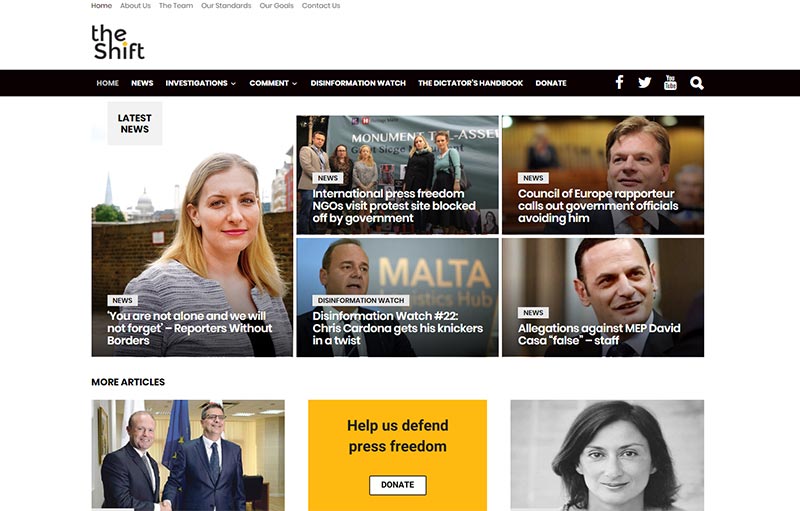[vc_row][vc_column][vc_single_image image=”103210″ img_size=”full” add_caption=”yes”][vc_column_text]“The murder,” says journalist Caroline Muscat, “was a message to the country that whoever investigates those in power and makes corruption visible, has to fear for his life. So we had to send a message back.”
Muscat seems to be in an adrenaline rush while talking in her apartment in a small town in the north of Malta. The interview was postponed twice for an hour because she had to convene with her colleagues about new stories for The Shift, the journalistic website that she and a colleague launched early November 2017. It was just weeks after the shock of the assassination of Daphne Caruana Galizia. The Shift is the message Caroline Muscat sent back to the perpetrators.
Malta doesn’t have a lot of independent journalism. Even media outlets that are not tied to a political party, have opaque ties with the political and entrepreneurial establishment. It is because of such ties that Caroline Muscat quit her job at the widely read Times of Malta in 2016: in publications about the leaked documents known as the Panama Papers, Caruana Galizia revealed that the managing director of the Times’ publisher was implicated too.
“I could not continue to work for the Times,” she says. She freelanced and made plans to start an investigative online paper, to be launched in the spring of 2018. Caruana Galizia’s murder accelerated the launch.
“Our goal is to hold those in power to account,” Muscat says.
That’s not a spectacular goal for a journalistic project. It does lead to remarkable choices though. Muscat tells about the arrest, in December 2017, of three men suspected of placing the bomb in Caruana Galizia’s car and detonating it. “We didn’t publish that news,” Muscat says. “We were immediately criticised about that. A government official even attacked me on Twitter, asking why The Shift didn’t publish about this breakthrough in the investigation.”
She explains – and still gets furious: “The men were detained with a grand show of force. In Malta, there are only a few people who know how to make bombs. Why weren’t they taken earlier? The arrested men have no motive for the murder. We want to know who is behind Daphne’s death. The arrests were a way to conceal that no serious investigation is carried out into the murder. As a journalist, I refuse to contribute to such a scheme.”
By performing journalism that way, The Shift works in the spirit of Running Commentary, the blog of Caruana Galizia. Also, Caruana Galizia didn’t care a bit about good contacts with powerful key figures in politics and business but investigated and scrutinised them, to attack if necessary. Muscat, however, resists the idea that she is following in Caruana Galizia’s footsteps: “Nobody can replace Daphne. She has been the target of hate campaigns and threats for years. Her dogs were murdered, her house was set ablaze. We often ran into each other because we worked on the same kind of stories, but she worked alone, I worked for an established paper. I was protected. She wasn’t.”
After resigning from the Times of Malta, Muscat also lost her protection, which became all the clearer when she started The Shift. An intense disinformation and hate campaign was launched against her, especially on social media, just as had happened to Caruana Galizia. Muscat and her family are, without any grounds, being connected to alcoholism, arms trade and prostitution. In secret Facebook groups linked to the governing Labour Party – where contributors to The Shift went undercover for half a year – pictures of Caruana Galizia and Muscat surfaced, accompanied by hateful comments (“She got what she deserved,” and “She deserves some bombs too”), generously supplied with likes by sometimes highly placed government figures.
Muscat immediately notices when a picture of hers has been doing the rounds again in such online networks. “This week the owner of a grocery shop asked me if I was the woman who publishes articles online. I am starting to get an idea now of the pressure under which Daphne has lived for years. Every aspect of my life has become difficult,” Muscat says.
The Shift welcomes some hundred thousand visitors per month and lives from donations. Muscat does other freelance journalistic work if necessary to earn enough income. Maybe, when the visitor stats rise, they will try to get revenues from advertisements. They usually publish several stories per day, both backgrounds and investigative work and analyses and columns. Muscat: “The Shift is journalism, but it is a movement too. Yes, I have an agenda. My agenda is press freedom, democracy, rule of law. We don’t have the luxury anymore to demand anything else. No, I don’t think The Shift will find the final piece of the puzzle that will solve Daphne’s murder. Such an expectation is unrealistic. All we can do is continue to investigate and contribute to adding pieces of the puzzle.”
Does she fear for her life? She circles around the question. She seems unable to ponder the issue. She does, however, point to an important difference between The Shift and Caruana Galizia’s blog: “The Shift doesn’t depend on me. We have a team. If one of us falls away, The Shift will continue.” [/vc_column_text][/vc_column][/vc_row][vc_row][vc_column][vc_basic_grid post_type=”post” max_items=”4″ element_width=”6″ grid_id=”vc_gid:1539599196129-2228dcb5-22a8-7″ taxonomies=”18781″][vc_raw_html]JTNDaWZyYW1lJTIwd2lkdGglM0QlMjI3MDAlMjIlMjBoZWlnaHQlM0QlMjIzMTUlMjIlMjBzcmMlM0QlMjJodHRwcyUzQSUyRiUyRm1hcHBpbmdtZWRpYWZyZWVkb20udXNoYWhpZGkuaW8lMkZzYXZlZHNlYXJjaGVzJTJGOTMlMkZtYXAlMjIlMjBmcmFtZWJvcmRlciUzRCUyMjAlMjIlMjBhbGxvd2Z1bGxzY3JlZW4lM0UlM0MlMkZpZnJhbWUlM0U=[/vc_raw_html][/vc_column][/vc_row]






